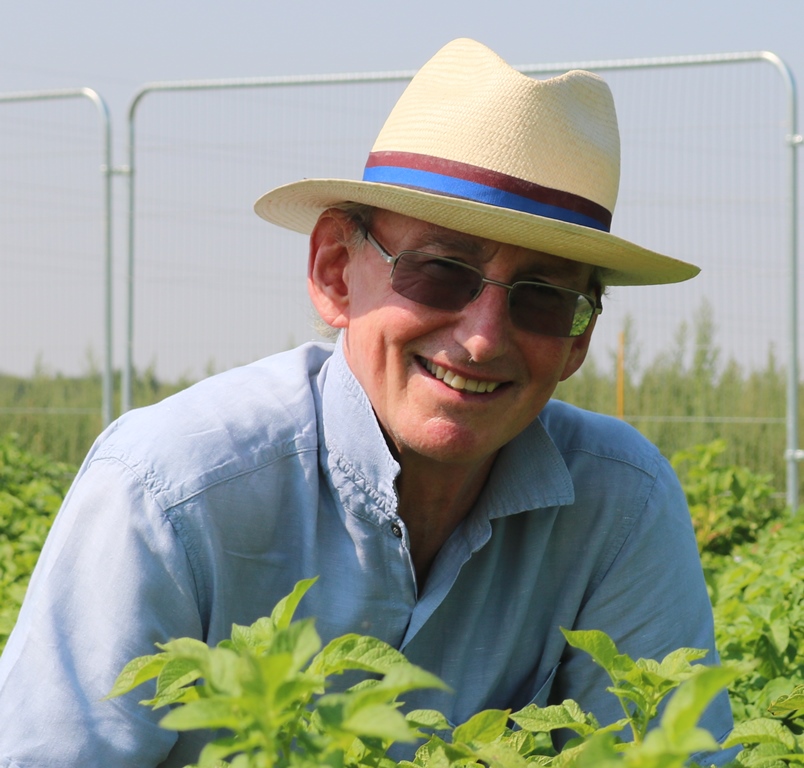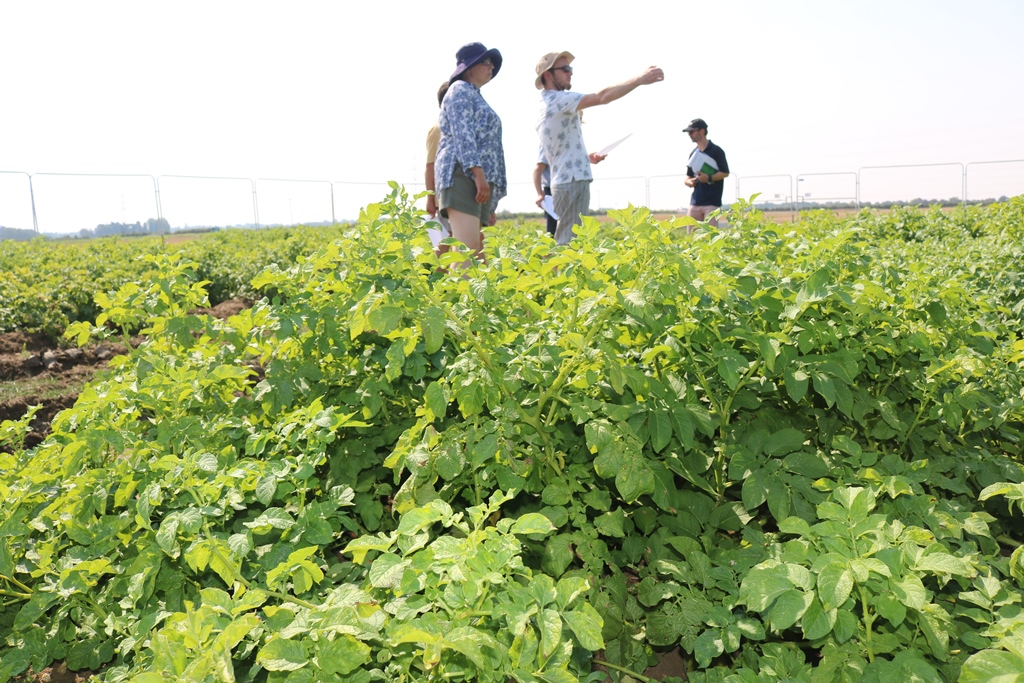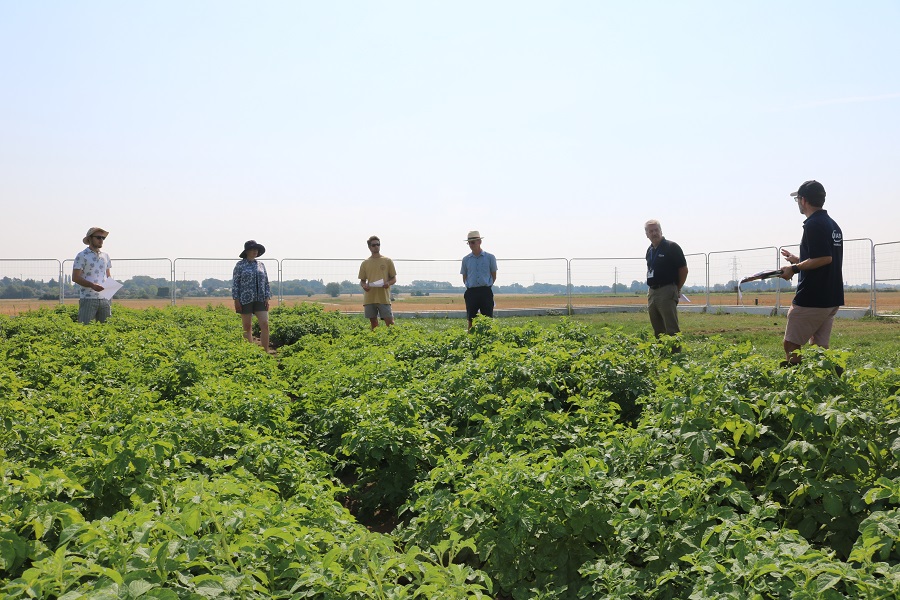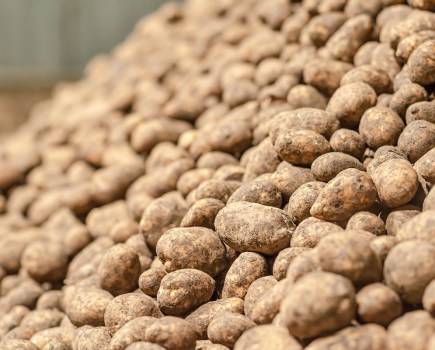Could blight-resistant, bruise-free, non-browning Maris Piper potatoes be close to market? CPM visits a trial and discovers an opportunity for growers.
It’s simply not technically feasible to cross in durable blight resistance to a variety like Maris Piper.”
By Tom Allen-Stevens
Prof Jonathan Jones takes a step back and casts his eye carefully over the trial plots of potatoes in front of him. “It looks like we’ve succeeded with the technical challenge. It’s the regulatory and commercial challenge we now face,” he says.
He and his team of scientists from The Sainsbury Laboratory, based in Norwich, have come to NIAB at Cambridge to view a field trial of Piper Plus. In almost every respect this variety is identical to Maris Piper, the most commonly grown potato in the UK.

Jonathan Jones heads up a team of scientists who have introduced three blight resistant genes into Maris Piper potatoes.
Except Piper Plus potatoes are resistant to late blight, to bruising and have lower levels of reducing sugars, such as glucose and fructose, which decreases the potential formation of acrylamide when cooking at high temperature. Growers are now being sought for a small-scale trial of this new cultivar, and while you’d have thought its attributes would make the potato highly desirable, there is a snag – the “commercial challenge” they face is that Piper Plus are GMOs.
“With potatoes, anything you do by traditional crossing changes everything,” explains Jonathan. “It’s simply not technically feasible to cross in durable blight resistance to a variety like Maris Piper, while retaining everything you like about the variety. That’s why we used GM technology.”
It’s taken his team over 20 years to get this far. “First you have to find your genes,” he notes. Screening started in 1998, and the first gene they identified was in Solanum venturii – a wild relative that grows in S America.
“We started putting resistance genes into Desirée as this is an easier variety to work with, and successfully made lines with the blight-resistant gene in 2008. The first field trials took place in 2010, and they were a complete success – the variety behaved exactly as its conventional equivalent, except there was no late blight.”
But it’s considered unwise to rely on just one gene for resistance, as this raises the potential for the pathogen to mutate and overcome it. “Most crop pathologists agree you need at least three genes to confer robust resistance to a disease – the genes act to protect each other.”
Technology in this field has advanced, so while historically it took 5-10 years to track down and isolate a gene, these days it takes 3-5 years, notes Jonathan’s colleague Dr Kamil Witek. “We invented a technique that allowed the screening to progress faster. But much of the difficulty lies in finding a gene you can rely on,” he says. Kamil found two additional stable genes in another wild relative, S. americanum, or black nightshade.
Meanwhile, hampered by regulatory restrictions in Europe, the team’s findings have gained greater commercial interest in the US. Simplot is a plant sciences company based in Idaho that developed the Innate potato, resistant to bruising and discolouration during frying.
“They achieved this through gene-silencing, a method also classed as GM,” notes Jonathan. “This has the effect of reducing oxidation of polyphenols, responsible for discolouration due to bruising. Another gene that’s altered regulates the conversion of sucrose to fructose and glucose – it’s the reducing sugars that causes the discolouration and lead to the formation of acrylamide during frying.”

UK growers now have the opportunity to grow blight-resistant Piper Plus by contacting the British On-Farm Innovation Network.
The advantage is that the potatoes can be stored at low temperature, he says, which would usually trigger the formation of sugars. This could allow the Innate-type potatoes to be stored without the chemical protection from sprouting provided by chlorpropham (CIPC), now banned in the UK. Innate Generation 2 potatoes also have a blight-resistance gene developed by TSL. They’ve passed through USDA approval and went on sale for the first time in the US in 2019.
Here in the UK, the team has produced several lines of Maris Piper with the three blight genes as well as the quality traits, and they are now repeating the achievement with Hermes, a variety better suited for crisping, notes Jonathan. This is the first year multiple Piper Plus candidate lines have been taken to yield trials – last year’s fungicide trials proved successful and showed it was completely resistant to late blight. “Piper Plus may still require one or two applications for Alternaria, however,” notes Jonathan.
The trials lie in a specially licensed and designated area of NIAB’s farm. The plots have been fenced off securely, while ACRE guidelines must be followed to ensure no GM material leaves the site. Line 27 looks the most promising to the TSL team inspecting the plots in early August.
But will Piper Plus be sold commercially in the UK? “The biggest regulatory hurdle is the expensive and time-consuming animal feeding studies, which in my view are unnecessary – we haven’t introduced foreign DNA but passed genes within the same genus from wild to domestic relatives. There are no unknown unknowns with this potato that could justify this level of scrutiny,” Jonathan argues.
Nigel Bazeley and Jeff Hooper from BioPotatoes have joined the group to assess the trial progress. The company was set up in 2010 to develop and commercialise varieties of potatoes bred using advanced GM technology.
“Worldwide there are some 180M hectares of GM crops grown across 28 countries by 18 million farmers, and in the USA around 75% of food consumed has a GM component,” says Jeff.
“Piper Plus has massive potential benefits for the environment and for the consumer, but it’s unlikely to reach the supermarket shelf in the UK unless there’s a major change in the way GMOs are regulated.”
The regulatory restrictions on GMOs
Field trials of all GMOs (which currently include gene-edited material) must be assessed by the Advisory Committee on Releases to the Environment (ACRE) prior to planting.
A license for the release must be obtained, which costs £5000, and the location of the site must be made publicly known. This makes the site easy to target by anti-GM activists, prompting those carrying out GM trials to implement additional security measures. But damage and disruption are rare these days.
Whether conventional or GMO, all variety trials follow good practice guidelines and are strictly regulated, conducted to a high level of scientific rigour and hygiene, etc. This ensures the results are valid and that the seed produces safe and reliable food crops. No variety from any trial or produce from it can be sold commercially until the variety is National Listed.
For GMOs, additional measures must be followed to ensure GM plant material is contained. These are specified by ACRE and vary according to the crop, but typically stipulate:
- No GM produce can be put into the human food chain or fed to livestock.
- GM plant material remaining at the end of the trial must be inactivated.
- Suitable measures may need to be put in place to prevent seed dispersal by birds.
- Sowing and harvesting equipment should be cleaned before leaving the site.
- The area may have to be left fallow for a number of years following the trial, or crops grown should not be for human or animal consumption.
- Groundkeepers and volunteers must be controlled for at least two years.
- After the fallow period, a similar crop to the GM plant should not be grown to allow easy identification of volunteers.
- A suitable separation distance from similar crops should be maintained to minimise the chance of cross-pollination. A pollen barrier may need to be planted for some crops.
Would you grow GM potatoes?
BioPotatoes is keen to work with the team at TSL and a small group of growers on a small-scale commercial trial. They’re seeking 5-6 growers who would each be prepared to grow around 0.2ha as a trial in 2022.
“We have regulatory hurdles to overcome, but we believe that if we’re honest and open with consumers about this technology, with a well labelled product grown by progressive UK farmers, there will be a ready market,” says Jeff.
Potato growers interested in taking part in this small-scale trial should contact the British On-Farm Innovation Network (BOFIN) by 30 Sept 2020.




